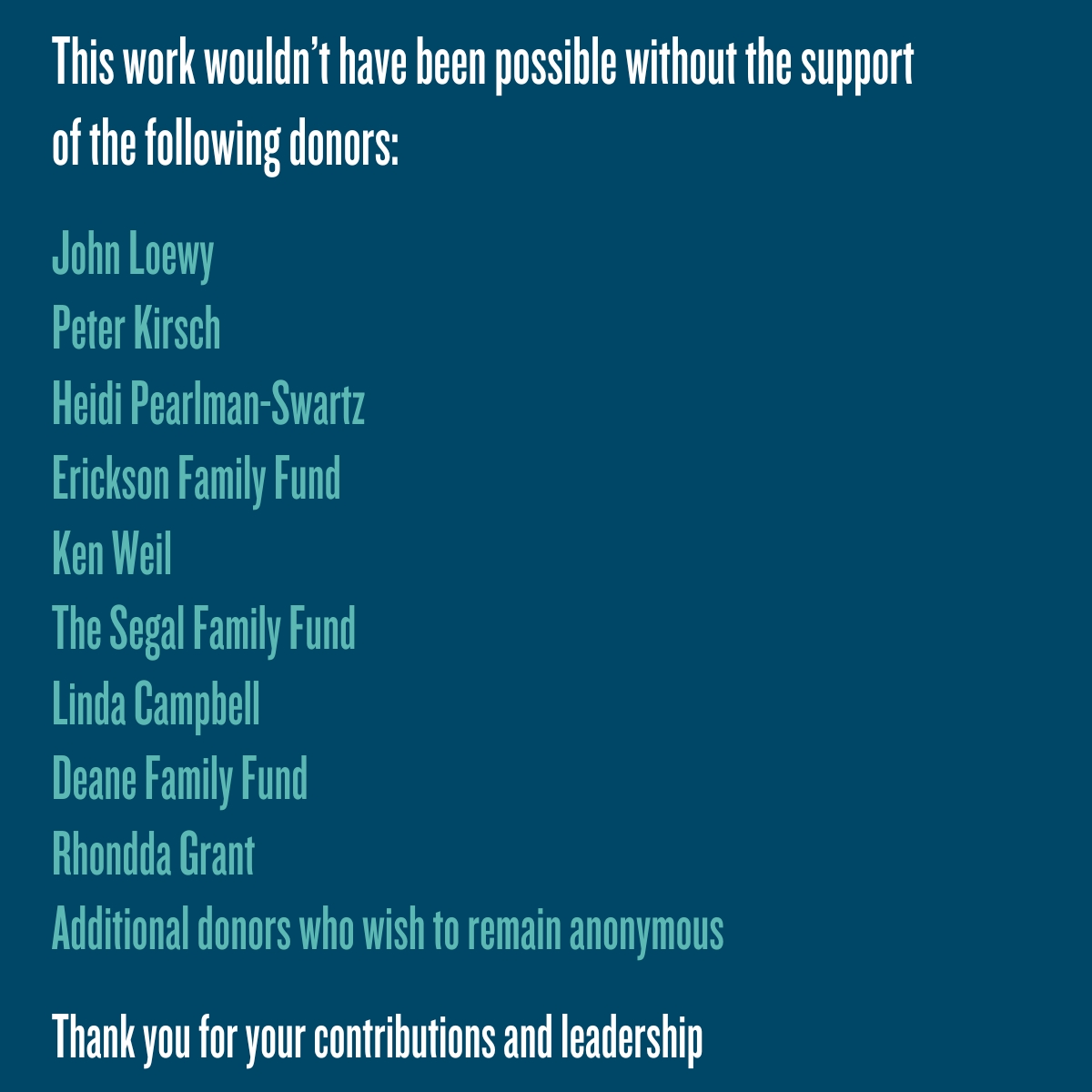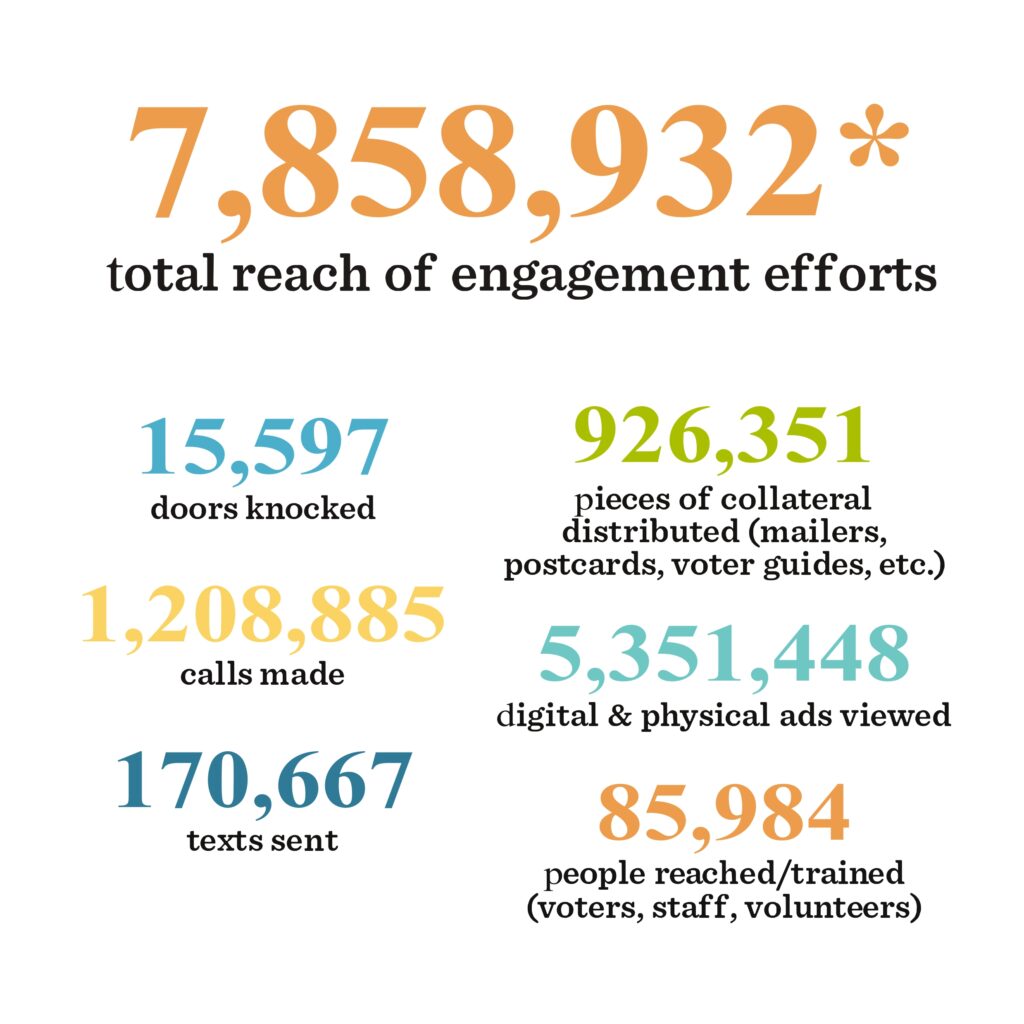For the third year, we funded 14 nonprofit organizations through the Civic Fabric Fund to educate and activate voters during the municipal and statewide elections in 2024. The awards totaled $99,500 and were intended to support organizations working to register, educate, and mobilize new and low-turnout voters from historically underrepresented communities.
This work would not have been possible without the support of the many generous donors of the Civic Fabric Fund.

Grantees
We funded 14 organizations in 2024. Of these, only 12 were required to provide final reports based on the scope of work and funding level. This report reflects data from the final reports from the following grantees:
- Latina Initiative Colorado
- Community Resource Center
- Colorado Immigrant Rights Coalition (CIRC)
- Colorado Asian Culture and Education Network (CACEN)
- Colorado Latino Leadership, Advocacy and Research Organization (CLLARO)
- New Era Colorado Foundation
- Colorado Public Radio (CPR)
- Common Cause Education Fund – Colorado Office
- Colorado People’s Alliance (COPA)
- Colorado News Collaborative (COLab)
- Colorado Fiscal Institute
- Colorado Civic Engagement Roundtable (CCER)
This impact report highlights some of the successes and outcomes achieved by these organizations. It also identifies some of the challenges and opportunities for future work.
Reach

*Total engagement reflects all efforts. Activity breakdowns vary by reporting approach and may not sum to the total.
Successes
In 2024, grantees continued to deepen their civic engagement efforts across Colorado, reaching historically underrepresented voters with a combination of culturally responsive strategies and strong community-rooted partnerships. Several key themes and successful tactics emerged:
- Increased engagement through hyper-local, community-driven outreach
Many grantees emphasized the value of hiring and training organizers directly from the communities they served. This approach, especially when mobilizers were multilingual and culturally fluent, fostered deeper trust and significantly increased engagement, especially among Latino/a, Asian American, Native Hawaiian, and Pacific Islander (AANHPI) voters, and other young voters of color. Door-knocking efforts reached thousands, and one grantee reported that 85% of engaged voters supported pro-family policies, affirming alignment with community values. - Reached Spanish-speaking and young voters through strategic digital media use
Organizations adapted and expanded digital outreach to engage young and Spanish-speaking voters. Several launched Spanish-language YouTube and Connected TV ads tailored for Latino/a voters in Colorado’s Front Range. Others shared information about voting through podcasts, text campaigns, and social media platforms like Instagram. In one case, a highly targeted video campaign led to more than 2,100 conversions and 1.7 million impressions. - Amplified voter education efforts through partnerships
Grantees built and deepened partnerships with trusted community-based organizations across the state. Through collaborations with more than 50 organizations, many of whom were newly engaged this year, grantees hosted events, distributed bilingual voting guides, and co-developed voter education materials. These relationships amplified voter education efforts and allowed trusted messengers to lead in community spaces. - Increased access by providing culturally relevant and bilingual resources
Many grantees translated all voter materials, including digital toolkits, into Spanish. Others offered live Spanish-language trainings or hosted Spanish-language community events, like a ballot party in Montbello conducted entirely in Spanish. This increased access and demonstrated cultural respect and inclusion. One media partner’s Voter Guide was praised for helping residents make “educated decisions” on Colorado’s historically long 2024 ballot. - Engaged first-time voters through community connections and celebratory events
Organizations successfully mobilized hundreds of people at festivals, “Vote Mobs”, and creative civic engagement events featuring food, entertainment, and ballot education. These celebratory spaces engaged first-time voters, fostered community connection, and shifted the perception of voting as a bureaucratic task to a collective, joyful action.
Lessons learned and opportunities
The 2024 cycle presented several challenges, particularly around voter apathy, operational capacity, and political polarization. Still, grantees surfaced valuable lessons for strengthening future work:
- Engagement must start earlier
The compressed timeline between ballot certification and Election Day remains a structural challenge. Many grantees emphasized the need to start voter education efforts by June, especially in years with complex ballots. Earlier preparation will also allow for deeper internal education among organizers and steering committees. - Conversations, stories, and bilingual guides help address voter disengagement and misinformation
Apathy, confusion, and disillusionment with candidates were among the top barriers to voter engagement. Grantees learned that printed bilingual guides, storytelling-based outreach, and issue-focused conversations helped move voters from disengaged to participatory. - Nonpartisan training is essential to navigate polarized environments
Grantees working in community education and voter protection had to carefully manage politically charged conversations, particularly around national races. Training participants to remain nonpartisan and focus on civic empowerment proved essential. - Relational strategies can help overcome data and volunteer recruitment gaps
Several organizations encountered limitations with voter data, especially around race/ethnicity identifiers, making it difficult to accurately connect with communities of color. Volunteer recruitment also fell short for some groups, revealing the need for stronger relational recruitment strategies and longer-term volunteer engagement. - Sustained trust-building is key
Many grantees underscored that building civic participation in historically excluded communities needs to be a long-term strategy. It requires deep, consistent investment in relationships, bilingual resources, and community leadership—not just during election seasons, but year-round.
One grantee shared, “This type of deep community work takes time… and we are proud of the relationships we continue to build and cultivate each year.”
Civic Fabric Fund
We are grateful for the work of these grantees and the efforts we are making together to encourage civic engagement. It is essential to our democracy.
If you are interested in learning more, please contact Naomi Amaha, Director of Policy and Government Affairs, at namaha@denverfoundation.org.
If you would like to support these efforts, please consider a gift to the Civic Fabric Fund.
Photo credit: Cisco Mora | @cisco_mora_photography
